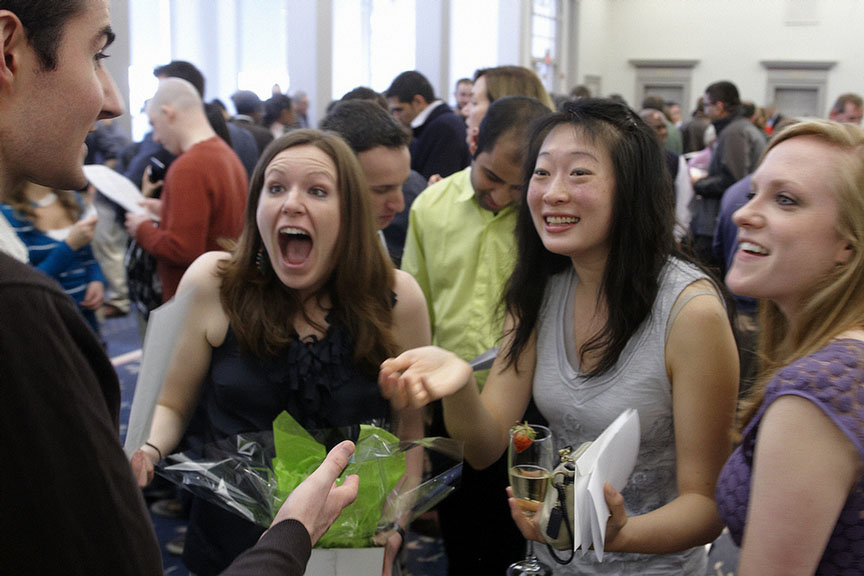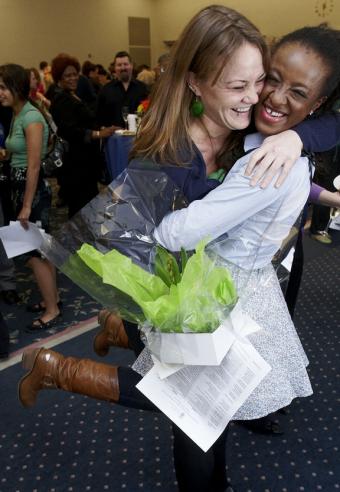Match Day, when graduating medical students at all U.S. medical schools learn where they will first work as doctors, is a ceremony for excited shrieks, fist pumps of joy, and new dreams. But is there any drama when everyone seems to be matching to one of his or her top choices? Yes — especially when a significant other at another medical school is matching somewhere, too.
That’s the situation that faced Bryan Beutel, an aspiring orthopaedic surgeon, at noon on March 17. First came the envelope. Then a quick skim of its contents and an excited, “Yes!” He was headed to New York’s Hospital for Joint Diseases for a six-year program that has only two slots a year. After five years of clinical training, he’ll have a one-year research fellowship where he hopes to study prosthetic joint replacements and ways to prevent osteoarthritis in the land of the five-story walkup.
“This what I wanted,” Beutel beamed. “This is my top choice.”
But then he politely interrupted the interview. “Can I just send a quick text?”
The message was to his girlfriend, a medical student at New York University who was also matching. At first blush, the news Beutel was sending seemed good because the Hospital for Joint Diseases is affiliated with NYU. But where would she match?

Credit: Hank Randall
“We’ve been together almost seven years by now, so we have a solid foundation to the relationship,” he said, “but we made the decision before, that if we didn’t match in the same city we would have to have a talk and do our best to work out the logistics in making our relationship work. Now fortunately that won’t be an issue.”
Across the great room at Andrews Hall, through crowds of students and their families (including several tiny children), the story that unfolded out of Samir Trehan’s envelope had similar themes. Like Beutel he’s headed for his first choice of residency in New York, at the Hospital for Special Surgery, affiliated with Weill Cornell Medical College. His fiancé at Stanford was matching today, too, but she’s sure to be in New York because the two are “couples matching.”
But for Trehan, the question was whether she’ll get everything she wants like he did.
“We’ve spent four years long-distance, so being in the same city is the most important thing for us,” he said, “but at the same time we both want to be in good programs so I hope the best for her.”
No matter what a student’s romantic status is on Match Day, the event is more meaningful than graduation, said Philip Gruppuso, associate dean for medical education at the Alpert Medical School.
“This is the big deal,” said Gruppuso, a keyboardist whose trio provided a smooth jazz complement to the floral arrangements and hors d’ouevres. “Their immediate future has now been determined. This is a day when students are really finding out what their hard work means for them.”
It also means a lot to Brown to have so many students matching in programs that satisfy their considerable ambitions.
“We evaluate ourselves by our ability to get our students into competitive programs — not because we want to brag about it, but because we want our students to be able do what they want to do,” he said. “There are lots and lots of examples here of students getting into really highly competitive programs.”
Of the 97 students at Match Day, 15 matched in Rhode Island at hospitals affiliated with the Alpert Medical School. The others are off to programs all over the country from Stanford to Harvard and in between.

But Allister didn’t even seem to need the good news of her match to get into the right spirit. One could even say she lit up the room — almost literally. She came to the festivities toting a purse made entirely of match books, wearing fireplace matches through a bun in the back of her hair, and wielding an oversized match “baton” butane lighter. Before going to medical school, the Rhode Island native studied materials science and fashion design at Cornell. Match day provided an irresistible excuse to further explore her creative side.
Now that her residency in internal medicine is set, she’ll explore three of her medical passions. “I’m a bit of a stem cell,” she said. “I could go any which way. I really like internal medicine, hopsital medicine, intensive care medicine and I like cardiology.”
An especially appealing aspect of her upcoming residency at Beth Israel Deaconness is that they have a track for studying medical education as well. Her adviser, Allen Dennison, said she was well known for composing and reciting little talks while on rounds.
“Because her name is Ginger, we call them Ginger Snaps,” he said.
Any doubt that Allister is a people person is completely cured by her philosophy of practice, which centers on the relationship between the doctor and her patients.
The most important thing she learned in medical school? “There is no substitute for time at the bedside,” she said. “In other words, being there with patients, sitting with them, talking with them, and helping them. No book or professor can substitute for being there for your patients.”
More than just a rite of career passage set to paper, Match Day is a life-changing moment. Young doctors responded all over with expressions of love and humanity.

